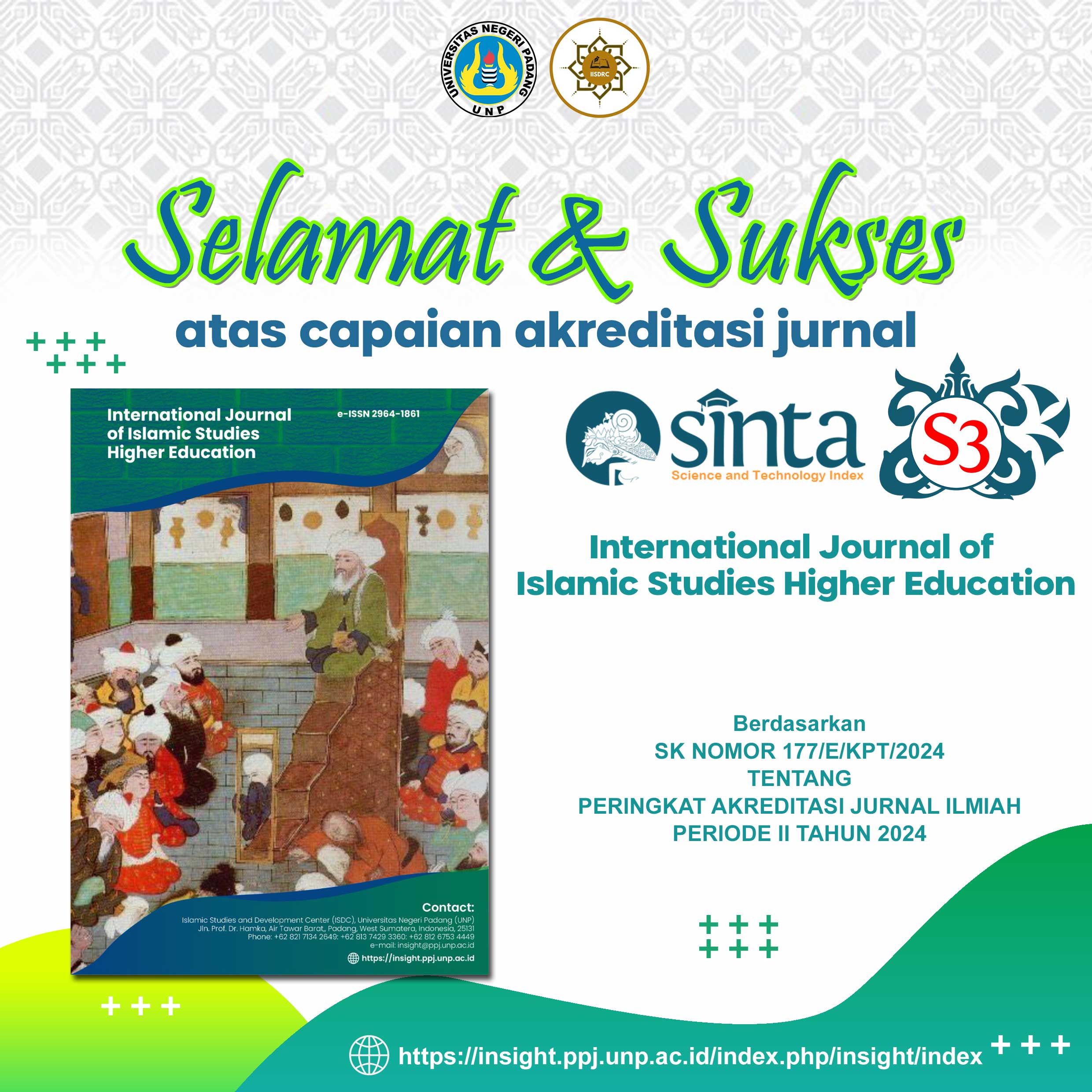Parenting Model and the Effects Toward Children’s Akhlaq: An Ethnographic Study of Coastal Community in Padang West Sumatera
DOI:
https://doi.org/10.24036/insight.v1i1.112Keywords:
Parenting, parent, coastal communities, children, akhlaqul karimahAbstract
This study aims to identify how the parenting style of parents in instilling morality in children among the people on the coast. This study uses a qualitative method with an ethnographic approach, data sources were taken to eight informants consisting of five female parents (mother), and three parents (male) through in-depth interviews selected using purposive sampling technique. All interview results were then analyzed using Miles and Huberman's qualitative analysis technique with four steps of analysis (data collection, data reduction, presentation and conclusion). Overall, the research findings found that, there are three forms of parenting carried out by coastal community parents in educating children's morals in their daily lives. The three patterns are first; authoritarian parenting, second; democratic, third; permissive. The results of this study can be used as initial data for future research in examining different issues related to this problem and other issues relevant to this context.
References
Adnan, M. (2018). Parenting Patterns in the Formation of Children's Morals in Islamic Education. Scholar: Journal of Islamic Studies, 4(1), 66-81.
Ahmed, B., Yousaf, FN, Saud, M., & Ahmad, A. (2020). Youth at risk: The alarming issue of drug addiction in academic institutions in Pakistan. Children and Youth Services Review, 118, 105385.
Alighieri, C., Bettens, K., Vanoost, L., Demuynck, K., Verhaeghe, S., & Van Lierde, K. (2021). Parents' perceptions on speech therapy delivery models in children with a cleft palate: A mixed methods study. International Journal of Pediatric Otorhinolaryngology, 151, 110958. https://doi.org/10.1016/j.ijporl.2021.110958
Altheide, DL (1987). Reflections: Ethnographic content analysis. Qualitative sociology, 10(1), 65-77.
Anggito, A., & Setiawan, J. (2018). Qualitative Research Methodology. CV Jejak Jejak Publisher
Anisah, AS (2017). Parenting Patterns and Its Implications for Children's Character Building. UNIGA Journal of Education, 5(1), 70-84.
Apriyani, DCN (2018). Trends in Parenting Patterns and Personality Types of South Coast Coast Students of Java. Transformation: Journal of Mathematics and Mathematics Education, 2(2), 1-11.
Bailey, S., & Isogai, Y. (2022). Parenting as a model for behavioral switches. Current Opinion in Neurobiology, 73, 102543. https://doi.org/10.1016/j.conb.2022.102543
Beedasy, J., Petkova, E. P., Lackner, S., & Sury, J. (2021). Gulf Coast parents speak: children’s health in the aftermath of the Deepwater Horizon oil spill. Environmental Hazards, 20(3), 248-263.
Bensaid, B. (2021). An overview of Muslim spiritual parenting. Religions, 12(12), 1057.
Bin-Tahir, S. Z., Amri, M., Nagauleng, A. M., Diniaty, A., & Hajar, I. (2019). The social media use for digital natives: Parenting model of muslim cleric families. International Journal of Scientific & Technology Research, 8(11), 2871-2874.
Dewi, KS, Prihatsanti, U., & Setyawan, I. (2015). Children's aggressive behavior tendency in central java coastal region: the role of parent-child interaction, father's affection and media exposure. Procedia Environmental Sciences, 23, 192-198. https://doi.org/10.1016/j.proenv.2015.01.030
Dong, Y., Lin, J., Li, H., Cheng, L., Niu, W., & Tong, Z. (2022) . How parenting styles affect children's creativity: Through the lens of self. Thinking Skills and Creativity, 45, 101045. https://doi.org/10.1016/j.tsc.2022.101045
Elvina, E., Ritonga, M., & Lahmi, A. (2021). Islamic Parenting and Motivation from Parents and Its Influence on Children's Ability to Read the Quran. Jurnal Tarbiyatuna, 12(2), 121-134.
Engkizar, E., Alfurqan, A., Murniyetti, M., & Muliati, I. (2018). Behavior and Factors Causing Plagiarism among Undergraduate Students in Accomplishing the Coursework on Religion Education Subject. Khalifa: Journal of Islamic Education, 1(1), 98-112.http://dx.doi.org/10.24036/kjie.v1i1.8.
Engkizar, E., Kaputra, S., Mutathahirin, M., Syafril, S., Arifin, Z., & Kamaluddin, M. (2022). Model of Interreligious Conflict Prevention Based on Community Activities. Harmony, 21(1), 110-129.
Engkizar, E., Muliati, I., Rahman, R., & Alfurqan, A. (2018). The Importance of Integrating ICT into Islamic Study Teaching and Learning Process. Khalifa: Journal of Islamic Education, 1(2), 148-168.
Engkizar, E., Munawir, K., Kaputra, S., Arifin, Z., Syafril, S., Anwar, F., & Mutathahirin, M. (2021). Building of Family-based Islamic Character for Children in Tablighi Jamaat Community. Ta'dib, 24(2), 116-126.http://dx.doi.org/10.31958/jt.v24i2.4847.
Entezami, P., Spurgas, MP, O'Brien, MW, Newman, LC, & Adamo, MA (2022). Utility of 3-dimensionally printed models for parent education in pediatric plagiocephaly. PEC Innovations, 1, 100077. https://doi.org/10.1016/j.pecinn.2022.100077.
Erhamwilda, E., Suhardini, A. D., Afrianti, N., & Tazkia, A. H. (2022, April). Islamic Parenting Paradigm. In 4th Social and Humanities Research Symposium (SoRes 2021) (pp. 409-411). Atlantis Press.
Fajrie, M. (2017). Communication Style of the Wedung Coastal Community of Central Java. INJECT (Interdisciplinary Journal of Communication), 2(1), 53-76.
Fitri, NL (2017). The Role of Parents in Shaping Children's Morals from an Early Age. Al-Hikmah: Indonesian Journal of Early Childhood Islamic Education, 1(2), 155-168.
Frydenlund, JH (2022). The Dirty Process of Creating Clean Absence Data: An Ethnographic Study. Scandinavian Journal of Educational Research, 1-17.
Gonzalez, C., Morawska, A., & Haslam, DM (2021). A model of intention to participate in parenting interventions: The role of parent cognitions and behaviors. Behavior Therapy, 52(3), 761-773.
Ha, AS, Jia, J., Ng, FF, & Ng, JY (2022). Parent's physical literacy enhances children's values towards physical activity: A serial mediation model. Psychology of Sport and Exercise, 102297. https://doi.org/10.1016/j.psychsport.2022.102297.
Hidayat, A. (2018). Islamic Education Methods For Millennial Generation. Phenomenon, 10(1), 55-76.
Hjorthen, SL, Sund, ER, Kjørholt, AT, Engevold, MH, & Krokstad, S. (2021). Public health in restructuring coastal communities: Generational trends in self-rated health following the decline in small-scale fishing. The HUNT study, Norway. Journal of Rural Studies, 88, 307-316. https://doi.org/10.1016/j.jrurstud.2021.08.013.
Downloads
Published
How to Cite
Issue
Section
License
Copyright (c) 2022 Rahmi Zen, Muhammad Zalnur, Munawir K, Yunita Pratiwi, Anggi Afrina Rambe

This work is licensed under a Creative Commons Attribution-ShareAlike 4.0 International License.











